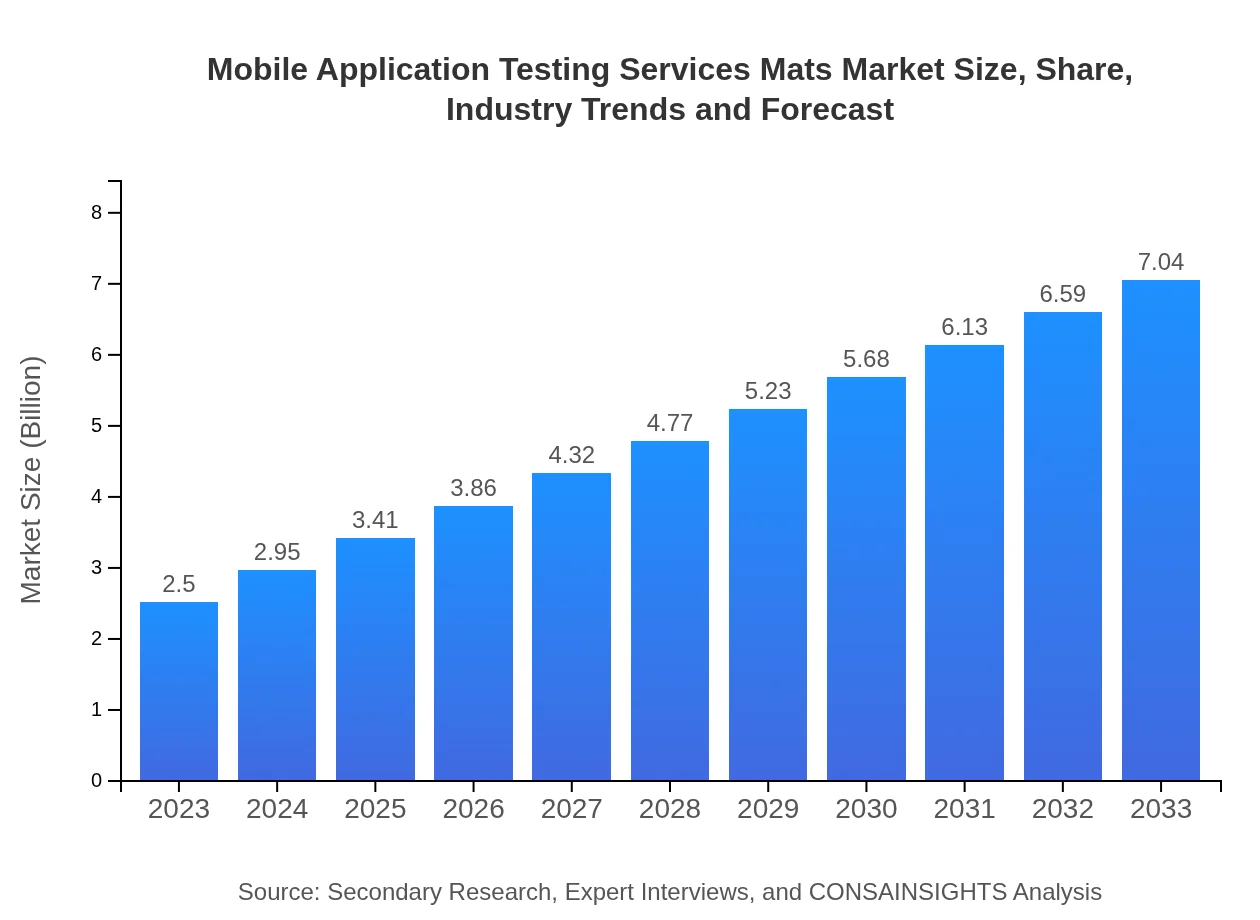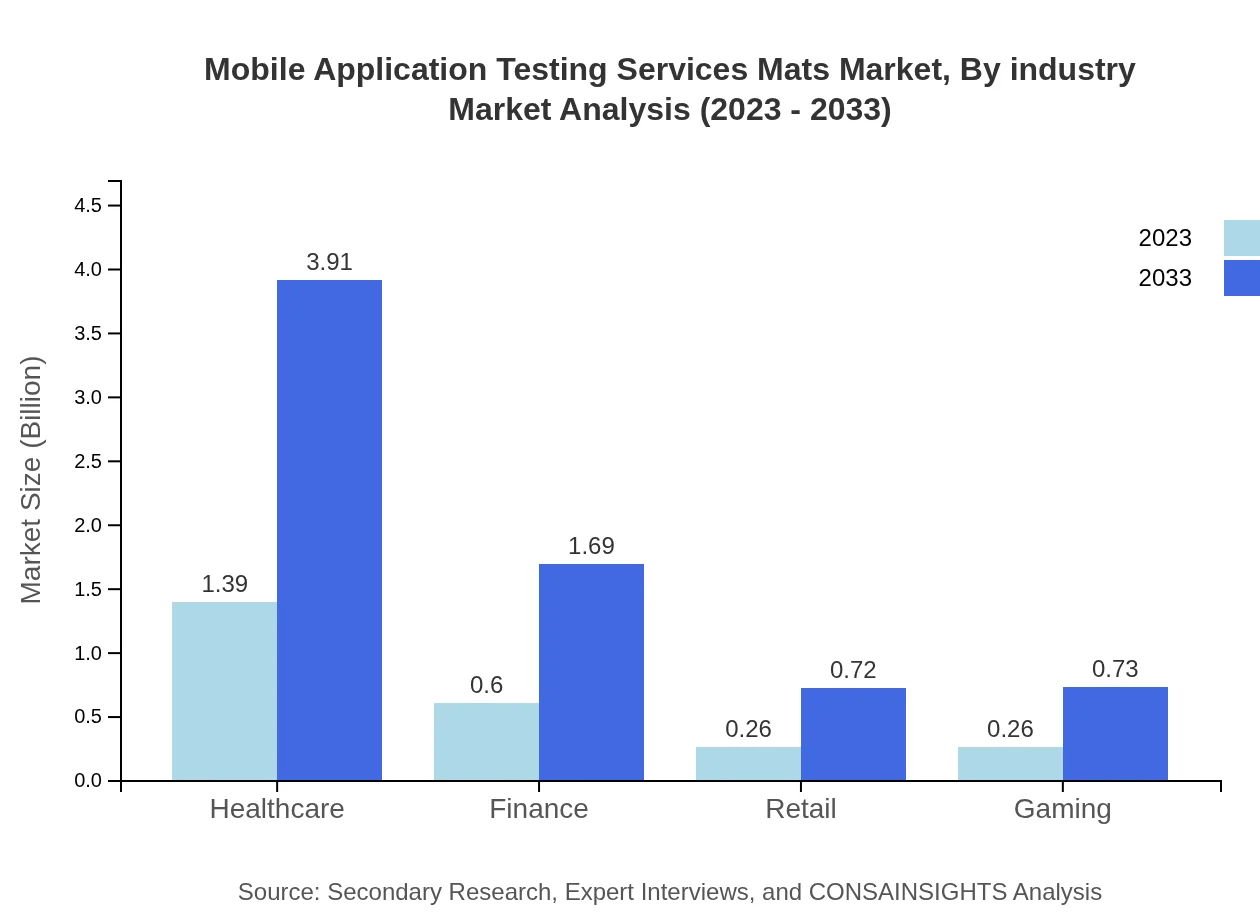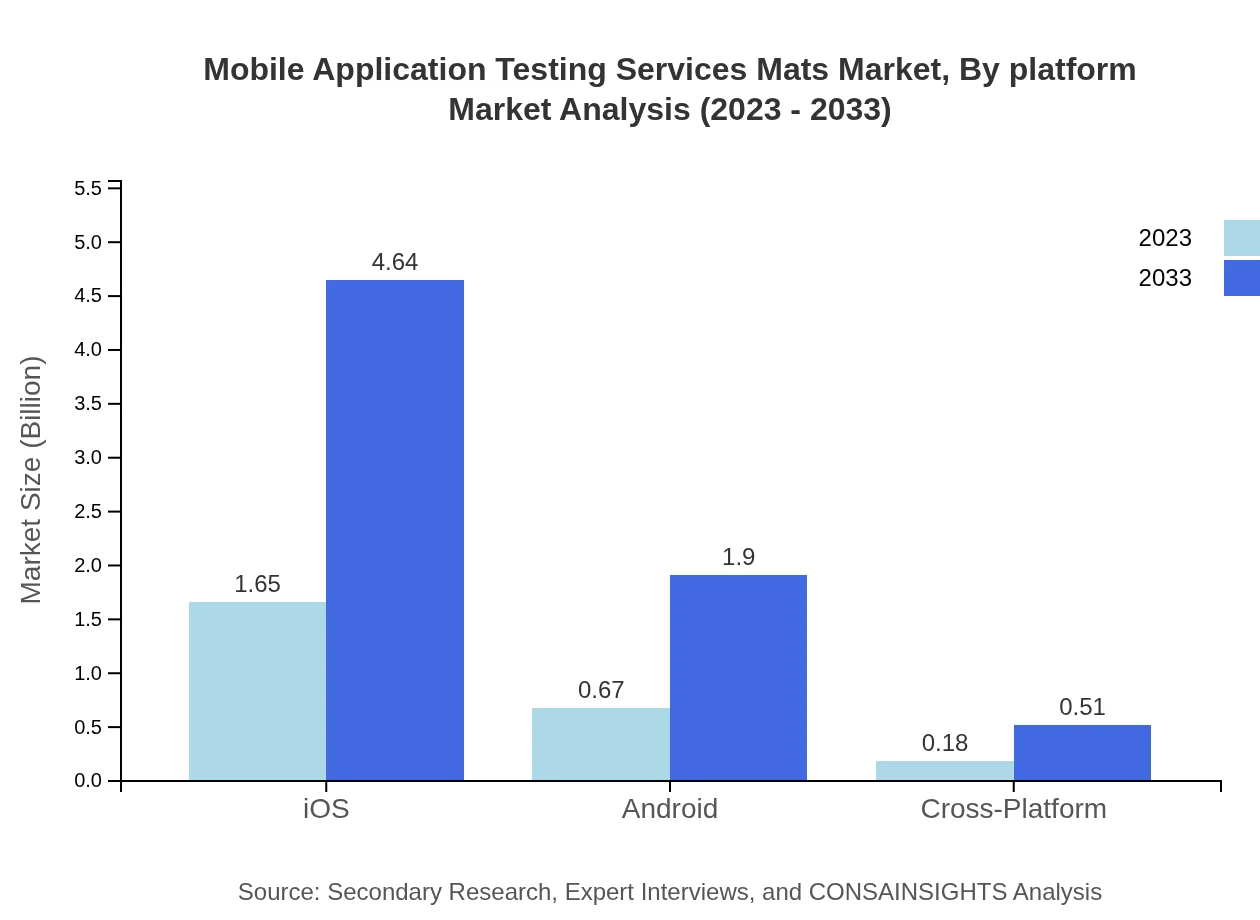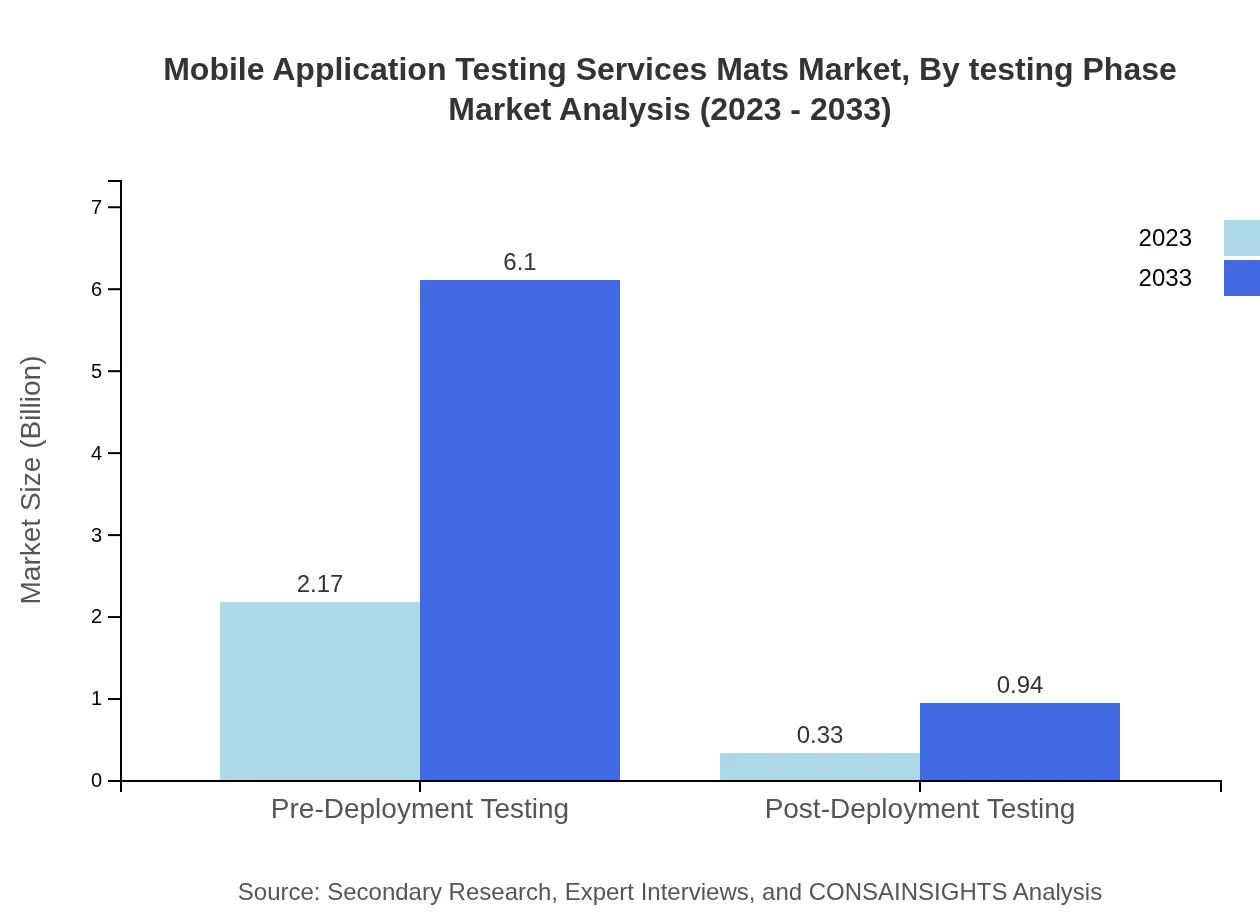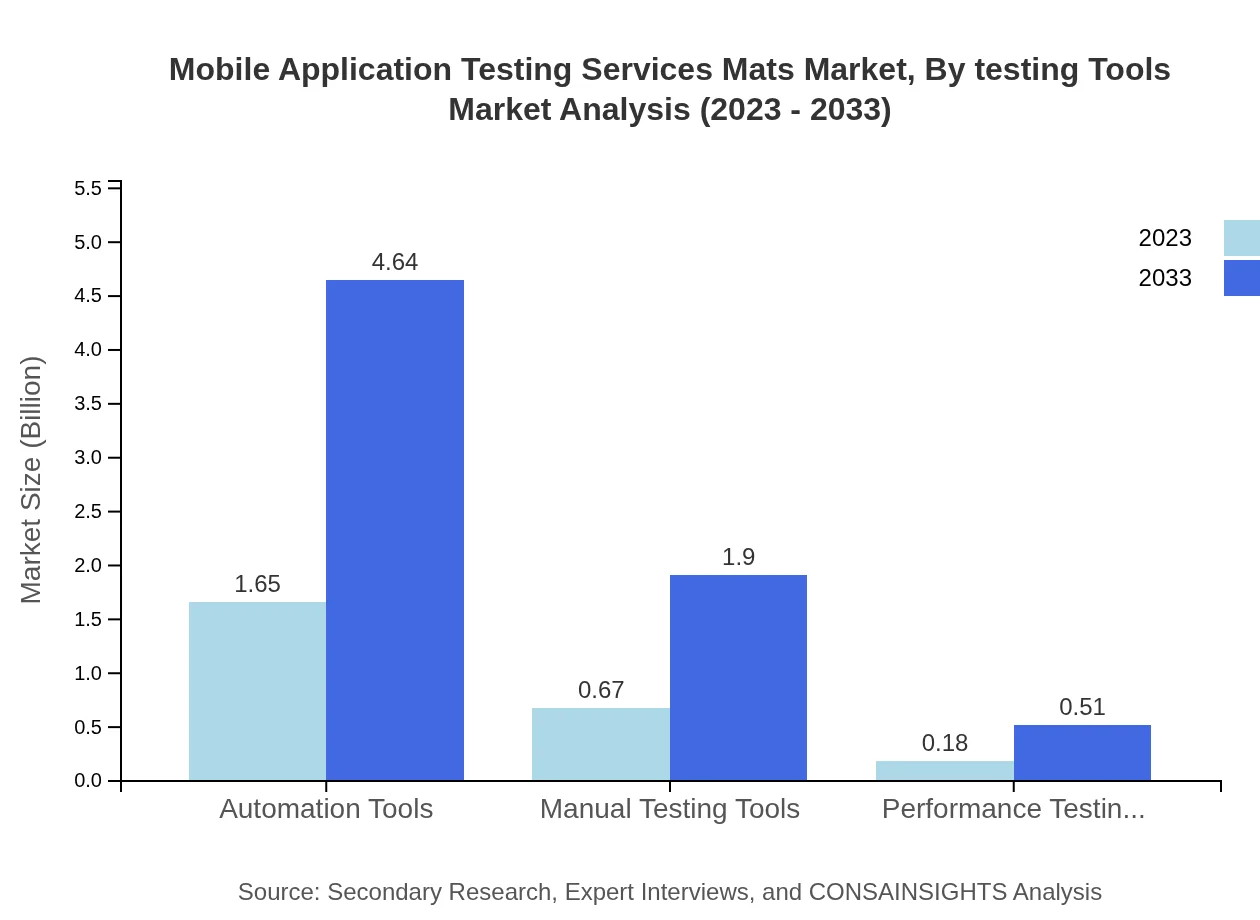Mobile Application Testing Services Mats Market Report
Published Date: 31 January 2026 | Report Code: mobile-application-testing-services-mats
Mobile Application Testing Services Mats Market Size, Share, Industry Trends and Forecast to 2033
This report provides a comprehensive analysis of the Mobile Application Testing Services (MATS) market from 2023 to 2033. Insights include market size, growth trends, regional dynamics, industry analysis, and forecasts, enabling stakeholders to make informed decisions.
| Metric | Value |
|---|---|
| Study Period | 2023 - 2033 |
| 2023 Market Size | $2.50 Billion |
| CAGR (2023-2033) | 10.5% |
| 2033 Market Size | $7.04 Billion |
| Top Companies | Tricentis, Applause, Sauce Labs, Perfecto |
| Last Modified Date | 31 January 2026 |
Mobile Application Testing Services Mats Market Overview
Customize Mobile Application Testing Services Mats Market Report market research report
- ✔ Get in-depth analysis of Mobile Application Testing Services Mats market size, growth, and forecasts.
- ✔ Understand Mobile Application Testing Services Mats's regional dynamics and industry-specific trends.
- ✔ Identify potential applications, end-user demand, and growth segments in Mobile Application Testing Services Mats
What is the Market Size & CAGR of Mobile Application Testing Services Mats market in 2023?
Mobile Application Testing Services Mats Industry Analysis
Mobile Application Testing Services Mats Market Segmentation and Scope
Tell us your focus area and get a customized research report.
Mobile Application Testing Services Mats Market Analysis Report by Region
Europe Mobile Application Testing Services Mats Market Report:
The European market is projected to rise from $0.77 billion in 2023 to $2.16 billion in 2033. This growth is attributed to stringent regulations regarding data security and a strong emphasis on high-quality mobile applications across industries.Asia Pacific Mobile Application Testing Services Mats Market Report:
In the Asia Pacific region, the Mobile Application Testing Services market is anticipated to grow from $0.51 billion in 2023 to approximately $1.43 billion by 2033, reflecting a CAGR of around 10.88%. Factors contributing to this growth include the increasing number of smartphone users and significant investments in app development.North America Mobile Application Testing Services Mats Market Report:
North America is expected to lead the market with an increase from $0.84 billion in 2023 to $2.37 billion in 2033, showcasing a strong CAGR of approximately 10.14%. The presence of major tech giants and increasing investment in mobile app development are key growth factors in this region.South America Mobile Application Testing Services Mats Market Report:
South America shows steady growth in the Mobile Application Testing Services market, with projected values growing from $0.09 billion in 2023 to $0.25 billion in 2033. This region is embracing mobile technology, particularly in sectors like e-commerce and banking, driving demand for effective testing services.Middle East & Africa Mobile Application Testing Services Mats Market Report:
The Middle East and Africa region is on an upward trajectory, with market size expected to grow from $0.29 billion in 2023 to $0.83 billion by 2033. The improvement in digital infrastructure and increasing smartphone adoption are pivotal factors for this expansion.Tell us your focus area and get a customized research report.
Mobile Application Testing Services Mats Market Analysis By Industry
In the healthcare sector, the market size is projected to grow from $1.39 billion in 2023 to approximately $3.91 billion by 2033, maintaining a share of 55.45%. The finance sector is expected to rise from $0.60 billion to $1.69 billion (24% market share). The retail and gaming industries follow with projected sizes of $0.26 billion to $0.72 billion (10.24%) and $0.26 billion to $0.73 billion (10.31%), respectively.
Mobile Application Testing Services Mats Market Analysis By Platform
The iOS platform dominates with a market size increasing from $1.65 billion in 2023 to $4.64 billion in 2033, accounting for 65.89% market share. The Android platform is set to expand from $0.67 billion to $1.90 billion (26.94% share), while cross-platform testing is projected to grow modestly from $0.18 billion to $0.51 billion (7.17% share).
Mobile Application Testing Services Mats Market Analysis By Testing Phase
Pre-deployment testing currently occupies a significant share with projected growth from $2.17 billion to $6.10 billion (86.64% share), indicating its vital importance. Post-deployment testing is expected to rise from $0.33 billion to $0.94 billion, accounting for 13.36% market share.
Mobile Application Testing Services Mats Market Analysis By Testing Tools
Automation tools, essential for enhancing testing efficiency, are expected to grow from $1.65 billion to $4.64 billion (65.89% share). Manual testing tools will also see an increase from $0.67 billion to $1.90 billion (26.94% share), while performance testing tools are anticipated to grow from $0.18 billion to $0.51 billion (7.17% share).
Mobile Application Testing Services Mats Market Trends and Future Forecast
Tell us your focus area and get a customized research report.
Global Market Leaders and Top Companies in Mobile Application Testing Services Mats Industry
Tricentis:
A global leader in continuous testing, Tricentis provides advanced testing solutions that integrate seamlessly into the agile development process, focusing on effective risk management.Applause:
Applause delivers end-to-end app testing services that leverage a global community of testers to ensure seamless functionality across various platforms.Sauce Labs:
Offering a robust platform for automated testing, Sauce Labs enables teams to enhance their app’s performance and security in real-time across different devices.Perfecto:
Perfecto specializes in mobile application testing, providing tools for continuous testing and integration that enhance the delivery of secure mobile applications.We're grateful to work with incredible clients.









FAQs
What is the market size of mobile application testing services?
The global market size for mobile application testing services is projected to reach $2.5 billion by 2033, growing at a CAGR of 10.5%. This signifies a robust demand in response to the increasing use of mobile applications.
What are the key market players or companies in the mobile application testing services industry?
Key players in the mobile application testing services market include leading technology companies specializing in software development and quality assurance, notable for delivering innovative testing solutions and enhancing user experience for various applications.
What are the primary factors driving the growth in the mobile application testing services industry?
Primary factors driving growth include the rapid adoption of mobile technologies, increasing complexities in application features, the rise of user demand for optimized mobile experiences, and the need for compliance with security regulations.
Which region is the fastest Growing in the mobile application testing services market?
Europe is the fastest-growing region in the mobile application testing services market, expected to expand from $0.77 billion in 2023 to $2.16 billion by 2033, showcasing strong demand and investment in quality assurance.
Does ConsaInsights provide customized market report data for the mobile application testing services industry?
Yes, ConsaInsights offers customized market report data tailored to specific needs within the mobile application testing services industry, allowing clients to access detailed insights and analytics that support strategic decision-making.
What deliverables can I expect from this mobile application testing services market research project?
Expect comprehensive deliverables such as market analysis reports, strategic recommendations, industry trends, competitive landscape assessments, and segmentation insights tailored to the specific needs of stakeholders in the mobile application testing industry.
What are the market trends of mobile application testing services?
Current trends show an increased focus on automation, integration of AI for testing processes, greater emphasis on security testing, and a shift toward continuous testing in agile environments, significantly shaping the future of mobile application testing.

